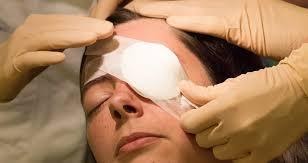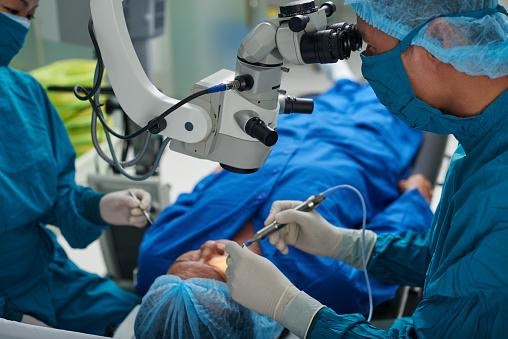What is Cataract Surgery: Cataract surgery is a quick and straightforward procedure that has an extremely high success rate. This success rate, however, is heavily dependent on your recovery.
Although the procedure is relatively risk-free, patients must follow a few post-operative recovery steps to ensure the best possible outcome.
Although this surgery has life-changing benefits, proper aftercare is critical. To learn more about the best post-cataract recovery steps, this blog summarizes what you need to know.
What to Expect in the Post-Operative Period?
While cataract surgery recovery time is relatively short in the grand scheme of things, there are some important precautions to take.

By skipping these steps of recovery, you risk developing complications, and infection, and spending more time in the doctor’s surgery than anticipated.
You will be unable to drive immediately following cataract surgery, so arrange for alternate transportation in advance.
You will be transferred to a recovery suite following surgery, where a protective shield will be placed over your eyes to prevent contact or rubbing.
Rest time in the recovery suite is typically between 30 and 60 minutes to allow for the wear-off of any anesthetic or sedative effects.
Because your surgeon will pay you a visit, do not be afraid to inquire about possible recovery complications and what to anticipate.
Six Steps to a Successful Cataract Surgery Recovery
Generally, your eye surgeon will recommend the following critical recovery steps:
1. AVOID DRIVING IMMEDIATELY AFTER SURGERY

While we’ve already mentioned that you will be unable to drive immediately following surgery, this restriction extends to a few days afterward as well.
This is typically 3-4 days after the cataract surgery, but your doctor must first clear you to drive.
Following your initial follow-up appointment, your surgeon will provide you with an estimate of when you will be able to drive again, based on your healing progress.
Remember to arrange for a ride home in advance of your cataract surgery! You will be provided with protective sunglasses to wear on your drive home and during your recovery period when you are outdoors. You can read about Expert recommendations for cataract surgery by visiting http://acupower.info/2021/12/26/expert-recommendations-for-a-cataract-surgery/
2. Protect Your Eyes
Your eye(s) are immediately covered with a clear, protective shield to protect them from rubbing, dirt, and pollutants following cataract surgery.
After a couple of hours, you can remove this shield. However, do not discard the shield, as it must be worn during sleep for the first 4-5 days following surgery.
Be aware that for a few minutes after the shield is removed, you may experience distorted vision.
The new, synthetic lens must adjust to the ambient light and may take several hours to dissipate.
Click here to read about How to Protect Eyes from Mobile and Computer Screens.
3. Avoid Exposure to Harsh Lighting
Another critical precaution is to avoid bright, flashing lights for the first 24 hours following cataract surgery.
This includes light from your television, mobile phone, tablet device, computer, or laptop, among other sources of light.
If your home has bright fluorescent lighting, turn them off and replace them with dim, lamp lighting whenever possible.
Keep in mind to take it easy and rest your eyes whenever possible. They require time to heal and must avoid being overwhelmed by stimuli.
An additional tip? Collect your prescription eye drops prior to the cataract surgery. This way, you can return home immediately and rest.
4. Exercise Caution When Bathing
Yes, you may shower or take a bath following cataract surgery. However, exercise extreme caution!
Avoid splashing or drenching your face with water, especially soapy water, at all costs. Avoid doing so for at least a week following cataract surgery to allow your eye(s) to heal.
Your eye is essentially an open wound that is susceptible to infection during the first week following surgery. Contaminating your eye with contaminated water can result in an unwanted infection and additional complications!
If you need to wash your hair, enlist the assistance of a partner or friend or pay a visit to your neighborhood hairstylist. However, caution them!
During the first week following cataract surgery, face wipes or a damp face cloth are ideal for a thorough face cleanse.
5. Schedule Follow-Up Appointments Consistently
This is a critical stage of recovery because your doctor will evaluate your healing and prescribe medication.
Your first appointment will be a post-operative check-up scheduled for the day following your cataract surgery. Remember to arrange for transportation to and from your surgeon’s offices in advance.
Your surgeon will then assess your healing progress and make necessary medication adjustments to prevent infection.
If you have any concerns or questions about your recovery, this is the time to speak with your surgeon. If your recovery is proceeding as planned, you should be cleared to drive within a day or two of this appointment.
Typically, another follow-up appointment with a general eye doctor is scheduled for a month later.
6. Adhere Strictly to Your Physician’s Instructions
This is a self-evident part of your recovery process, but following cataract surgery, your surgeon will sit down with you and go over a list of things to avoid.
It’s critical to take mental notes or request that he/she write everything down so you can refer to it during your recovery.
Several of these pointers may include the following:
- Wear dark, UV-blocking sunglasses outdoors for the first few weeks following surgery
- You will be unable to engage in strenuous exercise or heavy lifting for 3-4 weeks
- Complete your antibiotic course completely to avoid infection
- Similarly, ensure that your course of disinfectant eye drops is completed to avoid infection.
- Keep your home clean and dust-free for the first few weeks following surgery
- Avoid doing any cleaning around your home where dust and irritants could enter your eyes
- At all costs, avoid rubbing and scratching your eyes!
- Avoid submerging your head underwater for at least a week following surgery.
- Avoid wearing makeup, particularly eye makeup, for at least 2-3 weeks following surgery.
Consult your doctor immediately if you have vision loss, prolonged discomfort, bright flashes, nausea, or vomiting.
While this list may appear lengthy, a big portion of your recovery will be based on common sense. Consider your daily behaviors and their potential influence on your recovery.
In the first few days following cataract surgery, your eye(s) is essentially an open, healing wound. Take the utmost care in the first few days, and the rest will take care of itself!
